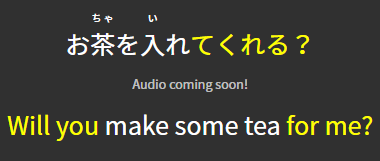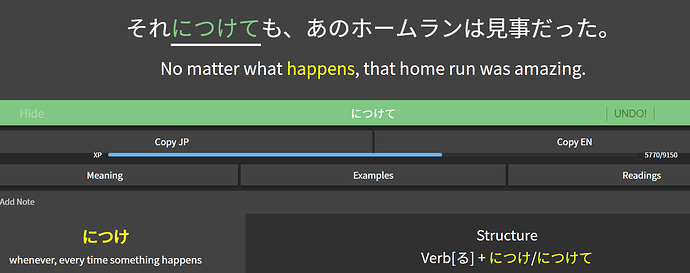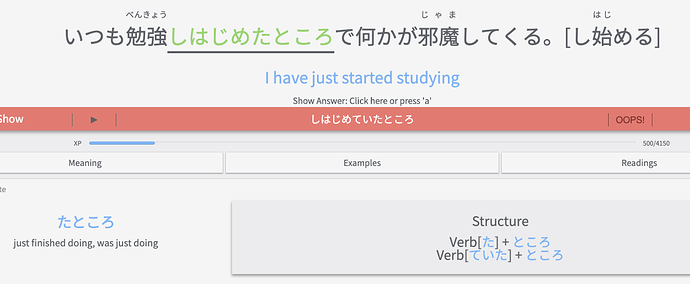@xBl4ck I did not take it that way at all! Thank you for providing such excellent feedback. It is always appreciated. Cheers!
After writing and editing this multiple times I really feel like I’m missing something here, since so much of the grammar point is seemingly included in other ones already. So… proceed with caution? 
__
The grammar point てくれない・てもらえない contains too much information in my opinion. While the included grammar points do have similar meaning, they are created in different ways (Problem being you have to understand multiple different concepts to learn one item and they’re all quizzed on the same interval)
It seems to contain てくれない, てもらえない, てくれる, てもらえる, ないでくれる and ないでもらえる
My attempt to explain thingies:
I am not sure why these are in there:

as てくれる is it’s own grammar point.
While てくれない? and てもらえない? are similar requests, one is formed with the potential form and the other isnt. Granted, this isn’t a 100% reason to pull these apart, but it has been done for less with other grammar points and I like that a lot. Cramming too much into the same srs interval usually isnt a good thing.
It feels better to group " ~ていただけませんか" with “~てもらえませんか” since they belong together and seperate “~てくれない?/~てくれませんか” from those two.
Edit:
Just realized “Verb[ て ] + もらえません・か” is already part of ~ていただけませんか? Why is it here again? I feel like I’m missing something 
Is it only because of the ない? ending?
Also, i feel like てもらえる shouldn’t be included here because, while it carries similar meaning, it feels different from the ~ない?/~ませんか ones. Can’t really explain that one, other than that it’s formed differently, so… ? 
Though I’m not sure if てもらえる would deserve a grammar point on it’s own, since its just てもらう in the potential form… 
Edit:
There’s also ないでくれる? (and probably ないでもらえる?) crammed in there. Kind of feels like these combined deserve a grammar point on their own as well.
All of this is probably a lot of work and not an ideal solution yet either, but the てくれない・てもらえない grammar point feels really overloaded the way it is right now.
@xBl4ck Thank you for providing this very detailed analysis! When we created these grammar points we intended to juxtapose the casual request てくれない・てもらえない with the polite/humble request ていただけません・てもらえません. In both of these instances, てくれない and ていただけません are the focus of these grammar points with the もらえない・ません versions taking the role of an alternative.
Since ないで is simply the negative て form, it still falls under the structure guidelines for these grammar points and may not require a separate grammar point.
That being said, we agree that these points could use another look. In the meantime, I have updated the structures and replaced the てくれる and てもらえる examples with their negative てくれない and てもらえる to hopefully reduce some clutter. Thanks again for drawing this to our attention. Cheers!
Is this Japanese sentence actually valid?
If it is, I feel like the English doesn’t reflect it very well. It comes across to me more like, “even if that happens every time” (with the “even” coming from も).
“No matter what happens” would be something more like どうしても, wouldn’t it? I don’t see how それ could translate to anything other than “that” here.
Hey 
we have replaced the example 
Thanks for noticing it!
This one confused me a bit, because both the hint at the bottom and the yellow text seemingly suggest that you’re supposed to answer “I have to ~”, even though you’re only supposed to answer “dont memorize in advance”
Hey 
verb[negative] + といけない is another construction that means “must”.
I have changed it to おぼえておかなくてはいけない since, there is no といけない lesson yet.
Cheers!
Ah, yeah, I figured that much because it follows the “if you don’t it wont be good”-pattern.
What confused me a bit is that usually, mostly everything in yellow is part of what you’ll have to type in. Those few that have part of the answer already typed in tend to slow me down a bit.
Then again, it was during my morning review session and the hint added some to the confusion, so it’s probably fine now that it’s gone 

So I’m assuming I just don’t understand this sentence. Why is it くなる at the end? “Become” wanting to take a bath. Is there something I don’t understand about the になる/くなる grammar point? Or does it have to do with とき (the actual grammar point for this sentence)?
@MissDagger Hi! This is the combination of Verb[たい] and なる. We have 入りたい, “want to enter” and なる, “to reach a state” or “become.” When Verb[たい] and なる are combined they behave similarly to い-adjectives in the same combination and become Verb たいくなる. Therefore, 入りたくなる literally means “To reach a state of wanting to enter.” Since お風呂に入る means “to take a bath,” the translation is closer to “I reach the point of wanting to take a bath.”
する → したい → したくなる
To do → to want to do → to reach the point of wanting to do
食べる → 食べたい →食べたくなる
To eat → To want to eat → To reach the state of wanting to eat (to get hungry).
Here’s some additional information. Hope this helps. Cheers!
Ah, I see. I was wondering what なる could add to already wanting to do something. But it is about when that wanting is reached. So basically, (when it is cold,) it/cold makes me want to take a bath (/reach the point of wanting to take a bath).
For わりに, I’m reading that は is optional (わりには) from DAJG though I see no mention in the BP entry. Other sources indicate the は add an emphasis. I also may suggest adding “despite” and “considering” as a meaning entry which is helping me.
Hi again,
A question about this review item…
Why is my answer wrong when it’s just like the 2nd one shown in the “Structure” area?
Is that a mistake in the item? Should that also be correct?
@s1212z Thank you for providing this information! I have updated the meaning page as well as alternative answers for all わりに review questions. Cheers!
@GregX999 Thank you for your comment. While not necessarily incorrect, there is a slight difference in meaning and wording that makes しはじめていたところ a little unnatural here. しはじめていたところ means: “just when I was starting to study” and しはじめたところ means :“have just started studying.” These phrases are perfectly fine by themselves, but if we add いつも (Whenever) into the mix we get: “Whenever I was just starting to study” and “Whenever I have just started studying” respectively. Just how in English, it sounds a little unnatural to say: “Whenever I was just starting to study” rather than “Whenever I am just about to start studying,” it sounds a little unnatural in Japanese. That being said, I have added a warning for this answer rather than marking you incorrect. Cheers!
I feel like なさる and なさい grammar points should be linked in the “related” section, as they’re pretty much the same thing.
Seems a bit weird that sources like Tae Kim tell you to remember that “「なさい」 only applies to positive verbs” instead of teaching it together with なさる, so maybe it deserves a mention as a note in the grammar point?
Hi,
Although my auto renewal is currently off (and has been since I stopped using Bunpro a few weeks ago), I have just been charged for the next month.
Could someone please look into this?
Thanks.
I straightened everything out and reversed the charge. I will take a look at what might have caused it. Sorry for the trouble!
If I fail an item in the “Quiz Me” bit at the end of the 3 lessons you get in the “Study” mode, do those items become Ghosts? Because I failed a couple this time and would like them to become ghosts so I can review how/why I got those ones wrong and try and understand/remember the grammar point more.
Right now they do not. One work around might be to go to the grammar point page for the grammar you want to drill extra and reset it and then review it through reviews once more. You will get a new sentence, but also get a little extra practice.
I will put this on our list to make sure we look more into it in the near future.
A manual add/remove ghost button would be lovely in general.






